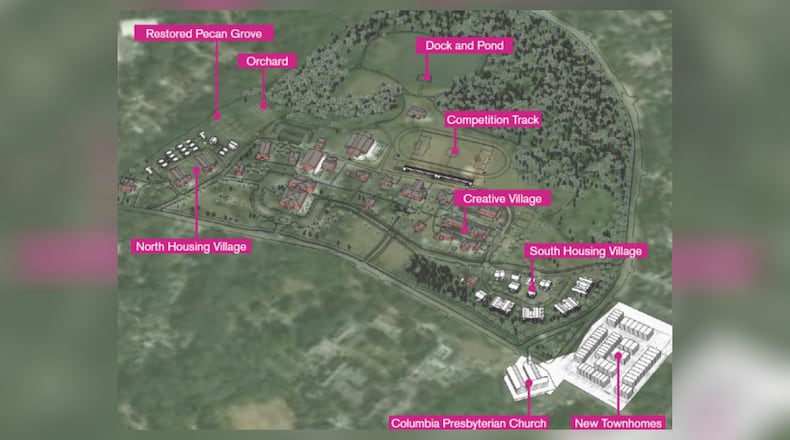Roughly four years after Decatur purchased a 77-acre plot of land, the city commission reaffirmed its vision of using the property to develop affordable housing.
According to a comprehensive site plan adopted in December, the area known as Legacy Park can undergo development of up to 175 units. Mayor Patti Garrett said the goal is for as many of those units as possible to be affordable.
However, a sizable portion of the city’s community said they feel slighted by the commission’s direction for Legacy Park, claiming the project’s purpose has changed significantly without community feedback.
During a Tuesday evening commission meeting, more than 25 residents made their voices heard, with opinions split on what they want to see for Legacy Park’s future. In addition, more than 1,100 people signed a petition to table the current plans until a ballot referendum can take place — a plea the commission declined.
“The commission at the time followed the process," Commissioner Lesa Mayer said following two hours of comments from the public. "That may not provide a lot of comfort to individuals who felt like they were not as much a part of that process, but a process as it was designed was followed and was appropriate.”
The city purchased the land for $40 million. It sits along the city’s eastern border. The property used to be owned by the United Methodist Children’s Home and now consists of parkland and several historic church buildings.
A Legacy Park master plan for the property was passed in December 2018 and outlined potential uses for the land. The parcel’s purpose was murky, with affordable housing being a possible priority.
A year later, the commission unanimously approved the amended plan, which made it clear that Legacy Park’s development would prioritize affordable housing. Eligibility has been defined by the city’s affordable housing task force as 30% to 60% of average median income — or annual salaries of $25,750 to $47,820 for a family of four.
Being one of the largest undeveloped parcels within the city’s limits, the commission saw it as an opportunity to address Decatur’s affordability issues.
Residents who spoke at Tuesday’s meeting were adamant they weren’t against an increase in affordable housing and said their concerns lie with the commission’s decision-making process and the proposed density of the development, which would remove eight acres of parkland.
“If we’re going to put an investment into affordable housing, which I don’t think anyone is disagreeing with ... this type of project should be put to public referendum for the people of Decatur to approve," resident David Spencer said.
Lynn Gathercold, who leads the Legacy Park Voice Group and created the petition, said she took her concerns directly to the mayor in a private Zoom conversation for more than an hour prior to the meeting.
“We paid $40 million for it," she said during the meeting. “We are a land bound community. This is it, so we have to figure out a way to come up with a plan that works for everyone.”
A common complaint was that the commission asked for feedback early on in the process regarding three potential plans for the property. The one that garnered the least support — about 9% out of 1,171 survey responses — featured the most housing units at 128.
Resident Todd Poole said it felt like the residents' voices were ignored. He added that the December 2019 amendment was only made public about two weeks before its vote, so many residents didn’t know about it until after it was approved.
“We had a significant revision — on something that was already rejected — first disclosed as an attachment to an obscure planning commission meeting and then approved without community notice just 13 days after it was released," Poole said.
The current plan includes dozens of cottages and duplexes in the North Housing Village (south of Derrydown Way) and more than 100 units in the South Housing Village (north of Katie Kerr Drive). A track, a playground and a “creative village” are also included in the plan.
Credit: City of Decatur
Credit: City of Decatur
Several members of the Decatur Affordable Housing Task Force were also present at the meeting and defended the city’s decision to increase the number of planned units on the property.
“Legacy Park is the biggest piece of developable land in Decatur, and we on the Affordable Housing Task Force believe it’s critical for the development of affordable housing over the next 10 years,” Elke Davidson, a chair on the task force, said.
Resident Phil Cuffey also supported the addendum, citing this as an example to right past wrongs.
“We’ve had missed opportunities in the past, and while we certainly can’t change the past, we can change the present and the future," he said. "And we can only do that by a commitment to affordable housing and diversity in Decatur.”
The mayor and commissioners discussed the feedback and criticism, but they came to the same conclusion.
“It’s the right thing to do, and the opportunities are closing," Mayor Pro Tem Tony Powers said.
Garrett added that the public will have future opportunities to weight in on the project as more tangible details are determined, but the affordable housing effort moves forward.
Correction: An earlier version of this story incorrectly attributed a quote by Commissioner Lesa Mayer to Commissioner Kelly Walsh.
About the Author
Keep Reading
The Latest
Featured


